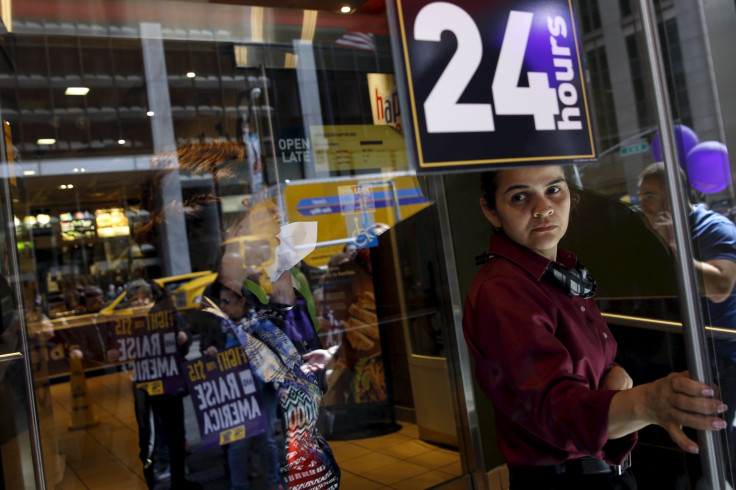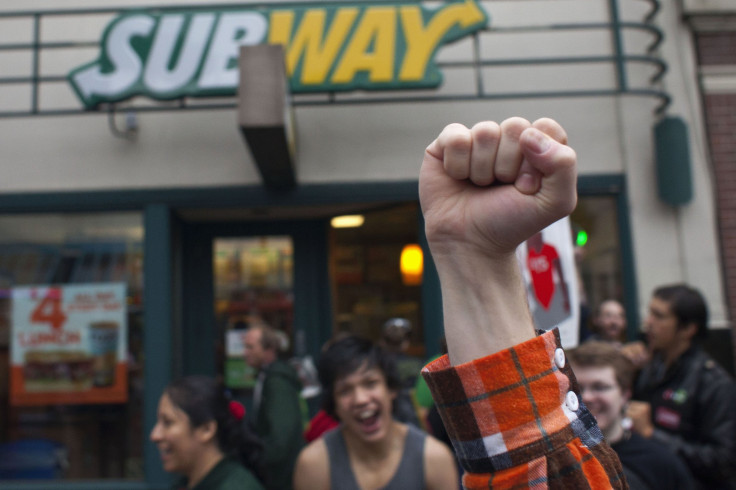Fight For $15: Fast-Food Industry Cries Discrimination Over $15 Minimum Wages

New York’s looming wage hike doesn’t make much sense to James Cammilleri. He owns three Burger King franchises upstate -- one just south of Buffalo, another near Rochester, and another one in Medina, about equidistant from both cities.
“Why are we being singled out?” he asks. “You say to yourself, why isn’t Wegman’s going to be imposed a $15 wage? It just doesn’t make sense.”
The popular upstate grocery store Cammilleri refers to pays the current statewide minimum wage of $8.75 an hour, set to rise to $9 by 2016, according to state law. But fast-food restaurants like the Burger Kings owned by Cammilleri will soon have to play by a different set of rules, thanks to recent recommendations from a special wage panel. Under the proposals, which the state is soon expected to approve, all fast-food chains with 30 or more locations nationwide will have to shell out at least $15 an hour by July 2021. Stores in New York City face an earlier deadline, of 2019. The first phase-ins take effect next year.
Conventional wisdom says it’s good news for fast-food workers. But what about their employers?
“We’re really in uncharted territory since neither New York nor any other state has had a wage this high,” says Jay Holland, government affairs coordinator for the New York State Restaurant Association, which bitterly opposes the wage board recommendation. “This sort of economic regulation is untested.”
So far, only a handful of cities have passed $15 minimum wages -- Seattle, San Francisco and Los Angeles. Unlike New York’s impending raise, those increases all apply across the board, not to a specific sector. No city currently mandates $15 an hour, although Seattle and San Francisco both began their respective phase-ins earlier this year. As the so-called Fight For $15 gains traction, these spots will be under close scrutiny. The two cities provide some clues as to how fast-food employers are adjusting to higher wages.
The Sky Hasn’t Fallen -- Yet
When confronted with increases in the minimum wage, restaurants have few immediate options. They can raise prices, fire people, cut hours, swallow the higher costs -- or pursue some combination of these.
David Jones owns two Subway franchises in Seattle that employ eight people each. When the minimum wage jumped from $9.47 to $11 an hour in April, Jones increased prices at both stores by 4 percent. Business went on just fine, he says. “I didn’t lose customers and my increase in price paid for my labor, so I did really well with this,” Jones says.
Researchers say it’s too soon to fully measure the impact of ongoing wage hikes in Seattle and San Francisco. Anecdotal evidence, though, suggests Jones’ experience is fairly common. Earlier this month, Chipotle announced it was lifting prices by 7 percent to 10 percent at its more than 80 San Francisco stores in response to the city’s new minimum wage of $12.25. Those higher prices have had no effect on business so far, according to the company.
To be sure, a number of small businesses have said they’re closing up shop because of the new pay floors. But the doomsday scenario of store closures and mass layoffs predicted by opponents of higher wages has yet to materialize.
There's still plenty of time left, though. And Subway owner David Jones says he’s especially worried about the next stage of the phase-in.
Starting in January, Jones must pay his employees at least $12.50 an hour, since the new law considers Subway a “large employer.” Meanwhile, small businesses -- including other restaurants -- will have to pay just $12. Even though everyone will eventually have to pay $15, Jones says next year’s pay gap will put him at a competitive disadvantage with nearby low-cost food options. One of his stores, next to Seattle University, competes with six small-business restaurants. The new law “will force us all to have different price increases,” Jones says -- something that risks upsetting or confusing customers. “That’s when it gets scary.”

In New York, Cammilleri’s stores will compete with restaurants paying even lower wages. He hasn’t done all the math yet, but he expects he’ll have to raise prices while cutting hours and considering layoffs for about a third of his 60 employees. “There’s no way to just raise prices and absorb the new costs,” he says.
Little Help From Franchisors
As they adjust to higher labor costs, both Jones and Cammilleri say they expect little help from the larger Burger King and Subway corporations -- the multibillion-dollar companies that labor advocates and politicians often deride for promoting exploitative labor practices.
When the corporations don’t own their stores themselves, they charge business owners tens of thousands of dollars a year in royalties for use of the brand name and advertising. In theory, the big corporations could ease the burden of looming wage hikes on their franchisees by drawing down their annual fees or by giving financial assistance to businesses.
Jones points to the popular $5 Footlong promotion. He says many Subway franchisees he spoke with consistently lost money on the deal and nobody ever received any financial assistance from the parent corporation. “We never got a break from that, so why would it happen for this? ... If I go out of business, they’ll have a new store in that location in one month.”
Cammilleri, who says he pays Burger King 7.5 percent of his annual revenue in royalties, agrees any kind of bailout or reduction in fees is highly unlikely. “I just don’t seem them reducing our fees.”
It’s Probably Going To Be Okay
Traditionally, economists assumed that increases in the minimum wage translated into modest job losses. Heated debates on this point abound, but new research suggests higher pay floors have little impact on employment overall. The prospects of sudden increases in labor costs may seem daunting to employers, but companies tend to earn the money back, this newer batch of research finds.
Michael Reich, director of the Institute for Research on Labor and Employment at the University of California, Berkeley, stands firmly in this camp, and authored a key study on the topic for the Los Angeles City Council.
“Many careful studies show that minimum wage cost increases are mainly absorbed through reduced employee turnover costs, increased productivity of more experienced workers and modest price increases,” he says.
Reich points to a 2007 study that found fast-food prices go up 0.7 percent for every 10 percent increase in the minimum wage. In other words, it's a modest bump. That $5 sandwich from McDonald's might cost $5.14 next year in New York.
Still, no real empirical evidence exists for pay hikes of this scale. “What works in Los Angeles," says Holland, the official from the restaurant lobby, "might not work in Potsdam or Oswego.”
© Copyright IBTimes 2024. All rights reserved.












